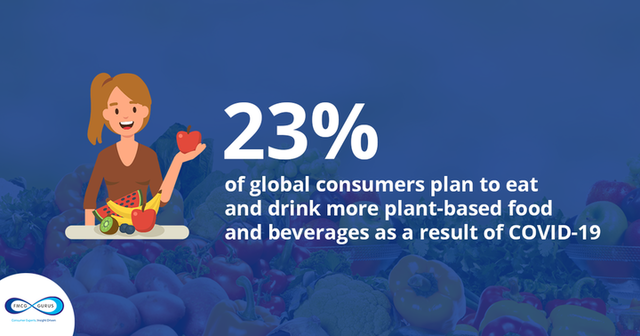Consumer perspective
Will Cowling
Marketing Manager
FMCG Gurus
United Kingdom


More...
ABOUT THE AUTHOR
As Marketing Manager of FMCG Gurus, Will Cowling is responsible for managing the day to day marketing tasks ranging from implementing campaigns, PR, to managing content on socials and the website. Understanding the business and the industry is key to providing innovative ideas and producing quality content.
Plant-based trends in 2020
Plant-based foods are not a new trend but it is gradually gaining momentum and become increasingly mainstream. The plant-based food market is now appealing to a growing proportion of consumers – even those who are not necessarily giving up intake of animal produce completely – because of rising levels of consciousness about health and sustainability issues. This has been amplified by the COVID-19 pandemic leading to consumers looking to adopt a healthier lifestyle and seeking natural foods to help stay disease free.

Health is a key driver for the plant-based industry as consumers look for naturally formulated products which can offer higher nutritional content. Consumers have become more conscious about their health and recognize that current dietary habits may increase the risk of serious health problems later in life. The meat industry has been associated to many problems such as obesity, hypertension, and other serious health problems which has led to a number of global consumers looking to reduce their intake. FMCG Gurus research shows that two in ten consumers over the past twelve months have stated that they have reduced or eliminated their meat intake. This is directed linked to a rise in consumers now classing themselves as flexitarians as 24% of global consumers state this.
Sustainability is also a key driver for the plant-based industry. FMCG Gurus research shows that 66% of global consumers who do not eat meat on a regular basis state they do this because they have environmental concerns. Over the past decade consumers have been increasingly concerned about the environment with many believe the damage done is irreversible. However, due to the COVID-19 pandemic consumers have a renewed sense of optimism that damage done to the environment is reversible. This sense of optimism has led to 46% of global consumers state they will be more attentive to sustainability claims made by brands, something in which plant-based brands will benefit from as they are heavily associated with being more sustainable.

Due to these key drivers many consumers are turning to meat substitutes and dairy alternatives. FMCG Gurus research shows that across the globe, 27% of consumers say that they turn to meat substitute products, whilst 41% of global consumers have turned to dairy alternatives. Plant-based dairy and meat alternatives are associated with high protein claims. Protein is associated with healthy living and is a key part to consumer diets. Although meat is still the main source of protein for many consumers, 59% of global consumer state they get their protein from plant-based foods whilst 34% get their protein from plant-based drinks.
Although consumers are turning to plant-based food and drink to lead a healthier and more sustainable lifestyle, taste is still crucial when targeting consumers. FMCG Gurus consumer insights show that 61% of global consumer state they believe real meat to be tastier. It is crucial that plant-based brands and manufacturers eliminate the associations of plant-based foods being bland and boring, whilst targeting ethical and health conscious consumers.



